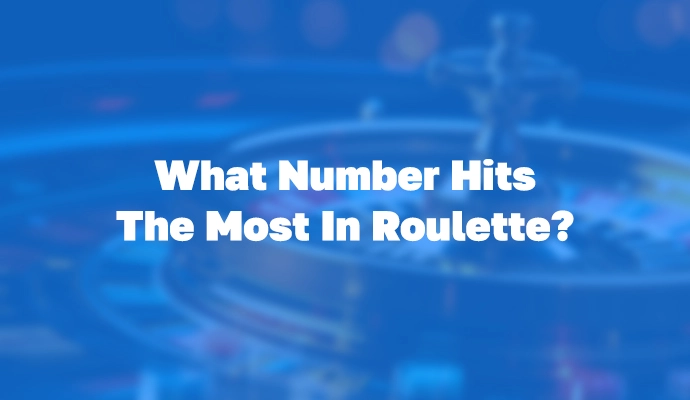
Roulette is a popular casino game that captivates the imagination of players worldwide. It is a game of chance, with outcomes determined by the spin of the roulette wheel. Gamblers often debate the existence of “common numbers” or “hot numbers” in roulette, attempting to identify patterns to increase their chances of winning. However, the truth is that each roulette spin is an independent event, and there is no surefire way to predict which number will hit the most.
So, what number hits the most in roulette? The correct answer is there is no such number. With every spin of the roulette wheel each number has an equal probability of appearing.
Understanding the basics of roulette is essential to approach the subject of common numbers in roulette. The American and European versions of the game differ slightly in terms of the number of pockets on the wheel. The European wheel has 37 pockets, with numbers from 1 to 36 and a single zero, while the American wheel has 38 pockets, including a double zero in addition to the numbers 1 to 36 and the single zero. Some players favor specific numbers or sections of the wheel due to personal preferences or superstitions, but it’s important to remember that the game is ultimately dictated by chance, and each number has an equal probability of appearing.
Key Takeaways
- Roulette is a game of chance, and each spin is an independent event
- The European and American roulette wheel variants have 37 and 38 pockets, respectively
- There is no predictable pattern for “common” or “hot” numbers in roulette; each number has an equal probability of appearing
Popular Roulette Numbers and Superstitions
The Most Common and Popular Numbers
Roulette players often have their own set of favorite numbers to bet on, with some numbers being more popular than others. The number 7 is widely considered a lucky number in various cultures and is frequently chosen by players. Another popular number in roulette is number 17, which is centrally located on the table layout and quite easy for players to remember. Other roulette numbers that people commonly bet on are their birthdays (day or month) or other personal dates, which makes numbers 31 or less more common. However, it is crucial for players to remember that each spin of the roulette wheel is entirely independent and has no impact on the outcome of future spins.
Roulette Number Superstitions and Myths
Superstitions and myths surrounding roulette numbers can vary across cultures and geographic regions. Among these superstitions, some people believe that certain numbers are inherently unlucky, while others believe they are lucky.
Lucky numbers:
- Number 7 is seen as lucky in many cultures, due to its association with religious and historical significance.
- Some people believe that even numbers are luckier than odd ones, as evenness symbolizes balance and harmony.
Unlucky numbers:
- In some Western cultures, number 13 is considered unlucky because it is believed to harbor negative energy, leading to unlucky events and tragedy.
- In certain Asian cultures, numbers like 4 or 9 are considered unlucky due to their pronunciation and meanings, which echo associations with death or suffering.
Regardless of the roulette numbers chosen to bet on, it is crucial for players to remember that these superstitions and myths do not impact the actual outcomes of the game. The roulette wheel relies on random chance and luck, meaning that each spin is entirely independent and unaffected by players’ beliefs or previous spins. By understanding this, players can focus on strategies to manage their bankrolls and enjoy the game.
Understanding Roulette Numbers
Roulette Wheel Layout
In the game of roulette, the wheel consists of alternating red and black colored pockets with numbers on them. The pockets are numbered from 0 to 36, with an additional 00 in American roulette. There are two types of number groups, odd and even. The numbers are also split into two colors, with odd numbers being red and even numbers being black.
In European roulette, the wheel’s number sequence is as follows: 0, 32, 15, 19, 4, 21, 2, 25, 17, 34, 6, 27, 13, 36, 11, 30, 8, 23, 10, 5, 24, 16, 33, 1, 20, 14, 31, 9, 22, 18, 29, 7, 28, 12, 35, 3, 26.
In contrast, the American roulette wheel includes both a single zero (0) and a double zero (00), increasing the total numbers to 38. The sequence of numbers on the American wheel is different from that of the European wheel.
Differences in Roulette Versions
There are three main versions of roulette: American, European, and French. While they share similarities, there are some key differences between these versions, particularly in their layout and house advantage.
- American Roulette: This version has both a single zero (0) and a double zero (00) on the wheel, resulting in 38 numbers in total. This addition of the double zero increases the house edge, making American roulette less favorable for players compared to European or French roulette.
- European Roulette: This version only has a single zero (0) on the wheel, totaling 37 numbers. The absence of the double zero gives European roulette a lower house edge than American roulette, making this version more popular among players.
- French Roulette: French roulette uses the same wheel layout as the European version, with a single zero and a total of 37 numbers. The primary difference between French roulette and the other versions lies in its unique betting options and layout on the table. French roulette also has a specific rule called “La Partage,” which returns half of a player’s even-money bet if the ball lands on zero.
While there is no specific pattern or formula to predict which numbers will be the most common in roulette, players often have personal preferences for certain numbers, such as 1, 3, 7, 13, or 17, based on factors like personal beliefs, superstitions, or previous experiences. Nonetheless, it is essential to remember that the outcome of each spin in roulette is entirely random and independent of previous spins.
Basics of Roulette
Roulette is a popular casino game that involves a spinning wheel and a small ball. The objective of the game is to predict which numbered pocket the ball will land in after the wheel is spun. There are various betting options a player can choose from, such as wagering on specific numbers, odd or even numbers, red or black pockets, and groups of numbers.
The roulette wheel
The roulette wheel contains numbered pockets ranging from 0 to 36. In addition to these numbers, there is also a green pocket marked with a single zero in European and French Roulette, and an extra green pocket marked with a double zero in American Roulette. These additional zeros play a crucial role in determining the house edge and the differences between the three main variations of roulette.
European Roulette
European Roulette features a wheel with 37 numbered pockets, including the single zero. French Roulette is quite similar to European Roulette, often sharing the same wheel layout. However, French Roulette typically employs specific rules and betting options that set it apart from other variations.
American Roulette
American Roulette, on the other hand, has a wheel with 38 numbered pockets; this includes both the single zero and the double zero. The presence of the double zero increases the house edge, making American Roulette slightly less favorable for players in terms of winning probabilities.
The numbers
The numbers on the roulette wheel are distributed in such a way that they achieve a balance between red (18) and black (18) pockets, as well as a balance between odd (18) and even (18) numbers. The arrangement of the numbers varies between the European and American wheels, but the overall aim of achieving the right distribution remains the same.
Bets
Bets placed on the roulette table can be classified into two main categories: inside bets and outside bets. Inside bets are wagers placed directly on specific numbers or combinations of numbers. Outside bets, on the other hand, are wagers placed on larger groups of numbers, such as red or black, odd or even, and various number ranges.
Famous Roulette Players and Stories
One of the most famous roulette players in history is Joseph Jagger, also known as “The Man Who Broke the Bank at Monte Carlo.” In 1873, Jagger realized that not all roulette wheels were perfect, and he employed several people to track the numbers on every roulette wheel in Monte Carlo’s famous casino. His strategy paid off, and Jagger walked away with a substantial fortune.
Another story that likely made number 17 a popular choice for roulette bets is the following: Sean Connery, the legendary actor best known for his role as James Bond, was also an avid roulette player. In 1963, Connery visited a casino in Italy and decided to bet on the number 17. Amazingly, the number 17 hit three times in a row, defying the odds and earning Connery a significant payout. However, this amazing victory was later revealed to be a hoax, merely a publicity stunt for the new James Bond movie in which he starred.
Another notable roulette player is Mike Ashley, a British billionaire and owner of the sports retail chain Sports Direct. In 2008, Ashley walked into a London casino and placed a massive bet on the number 17. His gamble paid off, and he walked away with a staggering £1.3 million win. This story demonstrates the nature of roulette as a game of luck, wherein a single spin can produce life-changing wins.
Conclusion
In roulette, the game relies on the random spin of the wheel, making it challenging to determine the most common numbers with certainty. However, understanding the layout of the roulette wheel and the odds can help players build their strategy.
The American roulette wheel has a clockwise sequence of numbers, including the 0 and 00, while the European roulette wheel has only the 0. Regardless of the type of roulette wheel, the odds of hitting a single number are 1 in 37 or 38, depending on the version being played. This means that each number is expected to hit once every 37 or 38 spins on average.
When it comes to betting, players should consider the payout odds and the probability of hitting a number. Single number bets offer the highest payout at 35:1, but also have the lowest probability of winning at 2.6%. Split bets and triple bets offer lower payouts but have higher chances of winning at 5.3% and 7.9%, respectively.
In order to develop an effective roulette strategy, players must keep in mind that the game is based on the laws of probability and mathematics. It is essential to remain disciplined and avoid chasing losses or relying on superstitions. While some numbers might appear more frequently in a set of spins, this is mainly due to the random nature of the game and should not be considered a reliable predictor of future outcomes.
